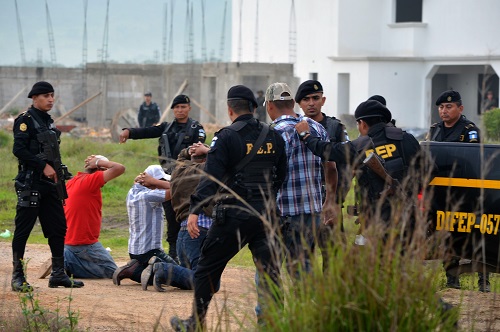AFP photo
By
Ricardo Swire
The main root of law enforcement corruption grows from the War on Drugs.
For more than four decades governments spent over US$1 trillion in national offensives to eradicate the disconcerting market. Allocation of such money meant less funding for more serious anti-crime programs. The financial allotment also left essential education, health, social service and public safety programs struggling to operate on meagre funding.
Drug Wars give some officers carte blanche, especially those close to political figures. Within police forces worldwide an Achilles Heel, caused by Drug Wars, has created the same kind of monsters the Roman Catholic Church did during decades of covering up sexual abuse and reassignment of accused priests to different parishes. One United Nations report estimated the global illegal drugs trade is worth more than US$320 billion. Such cash based business emits magnetic power.
Dubious law enforcement methods and special types of detention, such as recruitment and payment of shady Confidential Informants make rogue officers commonplace. Daily failure of the War on Drugs plays out in scenarios similar to the former Guatemalan National Civil Police (PNC) Lieutenant-Colonel, who assigned juniors to guard Mexican drug cartel Los Zetas’ cocaine shipments transiting Guatemala.
Between 2010 and 2015 the senior law enforcer earned a fortune providing underworld characters with leaked intelligence on local police operations. Ironically, the Lieutenant-Colonel officially performed the representative role of Guatemala’s main US ally in the fight against Central America’s organized crime. From 2012 to 2015 as Interior Minister he controlled both the PNC and Penitentiary System. The former police Lieutenant-Colonel utilized counterparts, in the prisons’ administrative sections, to establish an extortion network.
Victims were individuals deprived of liberty or prisoners squeezed for thousands of dollars to receive basic benefits. The ex-Interior Minister also recruited a former Guatemalan Special Forces soldier, jailed in 2001 for a 1989 murder, to rule as “King” of the prison system. The former police Lieutenant-Colonel reassigned vigilant PNC officers to facilitate Los Zetas’ cocaine consignments safe passage through Guatemala. The US Drug Enforcement Administration (DEA) possess a digital audio recording of him accepting a bribe, from “Jairo Orellana” a drug trafficker extradited to America in 2015.
The DEA’s relationship with the Guatemalan former police Lieutenant-Colonel/Interior Minister is illustrated in other Central American anti-drug effort partners. The Panamanian dictator, who worked with the DEA on counter-drug initiatives, nurtured a similar relationship. Panama’s top military General was ousted in a 1989 coup. He was subsequently extradited to and incarcerated in America, on drugs trafficking and money laundering indictments.
Unethical partisan networks, comprised of similar regional high-level officials, subtly receive US financial support. The duality of such characters plays prominent roles in Central America’s drugs trade and underworld. The US extradition request for Guatemala’s ex Vice-President demonstrates the stratum of recipients. The former senior politician is charged with “conspiring to introduce five or more kilograms of cocaine to the United States.”
Despite billions spent in the Drug Wars on eradication measures, from spraying coca fields high in the Andes to jailing dealers in Miami or Washington, a gram of cocaine cost sixteen percent less than last year. A similar decrease in heroin and methamphetamine prices is registered. The only drug that has not experienced significant yearly price reduction is Marijuana. Governments should acknowledge that drug dependency is a complex psychological condition not solved by punishment. The number of addicts or dealers arrested and tons of drugs seized alone does not constitute success.
Ricardo Swire
Ricardo Swire is the Principal Consultant at R-L-H Security Consultants & Business Support Services and writes on a number of important issues.



No Comments Yet!
You can be first to comment this post!